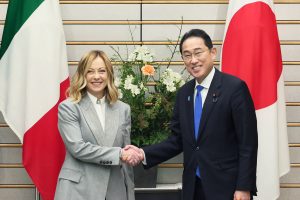Japanese Prime Minister Kishida Fumio and his Italian counterpart, Giorgia Meloni, have agreed on a series of measures to further deepen their bilateral defense cooperation through port calls by naval vessels, including an aircraft carrier strike group, as well as the joint development of a next-generation fighter jet.
Highlighting the growing convergence between the two countries, when Kishida and Meloni met in Tokyo on February 5, it was their fourth meeting in a little more than a year, following last year’s talks in Rome on January 10, in Hiroshima on May 18, and in Dubai on December 2.
This time, the two leaders agreed to work together toward the success of the Group of Seven (G-7) summit in June, with Italy taking over the presidency from Japan this year. Thus, their latest meeting virtually became the handover ceremony for the G-7 presidency.
“Japan and Italy are important strategic partners who share values and principles such as freedom, democracy, human rights, and the rule of law,” Kishida said at a joint press conference.
“We welcome that Italy is increasing its presence in the Indo-Pacific region, and that many Italian warships, including an aircraft carrier strike group, are planning to call ports in Japan and conduct joint training exercises this year,” Kishida added.
The Japanese prime minister said the two nations have agreed to further deepen cooperation in the defense and security fields by kick-starting the first round of foreign affairs and defense authorities consultations scheduled for March this year.
In response, Meloni said, “There has been a relaunch of collaboration in political and strategic terms with Japan.”
“The new consultation mechanism on security and defense will start in March, and there will be important joint military exercises, because Italy intends to have an increasingly significant presence in the Indo-Pacific,” she said.
Meloni unveiled the nation’s plan to send the Italian Navy’s flagship aircraft carrier, the Cavour, the Navy’s Vespucci training ship – an emblem of Italy’s soft power – and a fleet of its F-35 fighter jets to Japan.
In June of last year, the Italian Navy’s ITS Francesco Morosini, an offshore patrol ship, visited Yokosuka, south of Tokyo and home to the U.S. Navy’s 7th Fleet and the Japanese Maritime Self-Defense Force (JMSDF), as part of a five-month deployment to the Indo-Pacific. It became the first Italian Navy asset to anchor at a Japanese port in 27 years.
At that time, Admiral Ryo Sakai, chief of staff of the JMSDF, and Chief of Italian Navy Admiral Enrico Credendino, agreed to work together to make the two naval services’ relationship “as strong as Romeo and Juliet” at their second meeting during last year, according to the JMSDF.
Kishida and Meloni also welcomed the progress of cooperation in the joint development of a next-generation fighter aircraft, called the Global Combat Air Program – through which the two nations plus the United Kingdom will seek to develop a sixth-generation stealth fighter jet by 2035.
They also agreed to continue providing support to Ukraine and imposing strong sanctions against Russia, and to cooperate in dealing with China, which is becoming increasingly hegemonic.
In December of last year, Italy announced its withdrawal from China’s Belt and Road Initiative, becoming the first country to do so since the project was launched a decade ago.
The two leaders also shared the view that it is extremely important to cooperate with developing and emerging countries, the so-called Global South, in addressing the various challenges of the international community. They particularly discussed the situation in the Middle East.
Kishida and Meloni also agreed to include nuclear disarmament, artificial intelligence, and economic security in the scope of Japan-Italy cooperation.
The G-7 includes Britain, Canada, France, Germany, Italy, Japan, and the United States, plus the European Union. This year’s G-7 summit is scheduled to take place on June 13-15 in Apulia, southern Italy.































